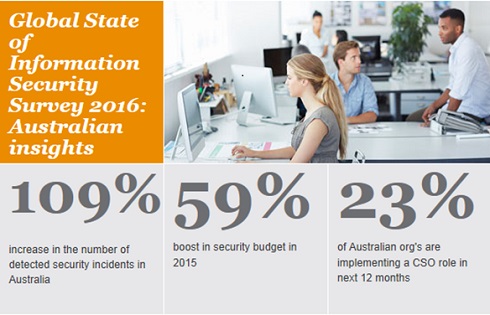Market Integrity Update � Issue 69 � March 2016
Issue 69, March 2016
- New internet address standard
- obÌåÓý surveillance system upgraded to capture new data
- FX provider requests suspension of AFS licence
- obÌåÓý launches newsletter for wealth and funds management industries
- PwC publishes Global State of Information Security Survey
- Mandatory clearing of OTC derivatives
- What obÌåÓý article should I read?
- Markets articles by obÌåÓý
- Stories from the beat
New internet address standard

In 2015 the internet ran out of addresses! To solve this issue, a new standard for internet addresses known as Internet Protocol version 6 (IPv6) was developed. This has implications for the systems participants use to determine origin of orders.
Every computer participating in a network that uses the Internet Protocol (IP) to communicate is assigned a unique numerical label or 'IP address'. This also applies to mobile devices (such as mobile phones or tablets).
Despite the introduction of IPv6, most organisations and individuals still use the original system, Internet Protocol version 4 (IPv4). This causes ongoing problems for telecommunication carriers, given the scarcity of IPv4 addresses.
To overcome this carriers have begun adding additional information to the end of the IP address. This creates a much larger number of options for IP addresses. The additional information is referred to as a 'port number'. There are 65,535 port numbers per IP address. Most networks have adopted this approach already.
When a client places a trading order through the internet, the device they use transmits its address to the participant's computer. In order to accurately identify the device being used by a client to place orders, a participant needs to capture the complete IP address.
Following the changes, this may include the IPv6 address and port number. Participants should review their information technology systems to ensure this information is being captured, in order to comply with the origin of order requirements in the obÌåÓý market integrity rules.
obÌåÓý surveillance system upgraded to capture new data
 obÌåÓý is upgrading its Market Analysis & Intelligence (MAI) surveillance system to capture new data from market platform and product innovations.
obÌåÓý is upgrading its Market Analysis & Intelligence (MAI) surveillance system to capture new data from market platform and product innovations.
In late-2015, a new investment product market was launched on Chi-X, facilitating the quotation and trading of warrants (with exchange traded funds to follow). This year, new trading platforms will be introduced to ASX and ASX24.
Participants have undertaken substantial work to ensure their internal systems comply and can connect with these platforms. Likewise, the emergence of new platforms and products creates entirely new data streams that must be integrated into obÌåÓý's market surveillance.
Fortunately, MAI was purpose-built with the agility to incorporate new data into its processes. This allows us to keep pace with innovation, with no deterioration in our ability to survey the marketplace.
We will also be ready to receive and analyse data from the new ASX and ASX24 trading platforms when they come online. This means we are well-placed to stay at the forefront of market surveillance.
FX provider requests suspension of AFS licence
 Forex TG Pty Ltd (Forex TG) has voluntarily asked obÌåÓý to temporarily suspend its Australian financial services (AFS) licence to give itÌýtime to restructure, rebrand and ensure compliance with its regulatory obligations after changes in ownership, management and strategy.
Forex TG Pty Ltd (Forex TG) has voluntarily asked obÌåÓý to temporarily suspend its Australian financial services (AFS) licence to give itÌýtime to restructure, rebrand and ensure compliance with its regulatory obligations after changes in ownership, management and strategy.
The suspension does not allow Forex TG to onboard any new clients or allow them to place new client orders. Forex TG will be able to close out any current open client positions. Forex TG will be providing clients with additional information about the suspension, including the steps required to withdraw money from their accounts.
It is expected the suspension will be lifted once Forex TG demonstrates to obÌåÓý that it is ready to recommence its licensed business activities and is able to comply with Australian obligations.
obÌåÓý Commissioner Cathie Armour said, 'We support this type of proactive move by any AFS licensee that recognises it needs time to fully review its operations to ensure compliance with its regulatory obligations. It will also help to ensure that any significant structural or strategic changes do not result in breaches of its obligations which could negatively impact investors.'
obÌåÓý launches newsletter for wealth and funds management industries
 Broaden your understanding of obÌåÓý's regulatory priorities and activities!
Broaden your understanding of obÌåÓý's regulatory priorities and activities!
obÌåÓý is launching a free monthly newsletter for people working (or with an interest) in regulatory developments in the superannuation, banking, insurance, wealth and funds management industries.
The obÌåÓý Wealth and Funds Management Update will provide news and information about obÌåÓý priorities, surveillance activities, projects, guidance and other information relevant to these industries. Like the Market Integrity Update, it will be emailed directly to subscribers or available to view on our website.
Make sure you're on the list to receive the very first edition by subscribing now.
PwC publishes Global State of Information Security Survey
PwC has released its .
The survey observes that businesses are responding to rising cyber risks by investing in core safeguards:
- 54% have a Chief Information Security Officer or Chief Security Officer in charge of security
- 48% undertake active monitoring or analysis of security intelligence
- 52% have security baselines or standards for third parties
- 53% have an employee training and awareness program, and
- 49% conduct threat assessments.
The survey also includes an '' (PDF 2.45MB) which makes for interesting and compelling reading.

Source: PwC, Ìý(PDF 2.45MB).
obÌåÓý comment
In the aftermath of a malicious cyber activity, the consequences of failing to implement appropriate safeguards may extend beyond the immediate operational and reputational damage.
This was seen in the 2015 when an investment adviser was charged by the US Securities and Exchange Commission (SEC) for failing to establish cyber security policies and procedures to protect customer records and information ahead of a breach that compromised client information. The adviser subsequently agreed to settle the charges. .
Mandatory clearing of OTC derivatives
 New rules for over-the-counter (OTC) derivatives commence on 4 April 2016. The will affect major domestic and global investment banks. Smaller financial institutions and corporate end users will not be affected.
New rules for over-the-counter (OTC) derivatives commence on 4 April 2016. The will affect major domestic and global investment banks. Smaller financial institutions and corporate end users will not be affected.
The rules impose a mandatory central clearing regime in Australia for OTC interest rate derivatives denominated in Australian dollars (AUD interest rate derivatives), US dollars, euros, British pounds and Japanese yen (G4 interest rate derivatives).
The rules will apply to Australian and foreign financial organisations that meet the clearing threshold of $100 billion total gross notional value in derivatives transactions.
Mandatory clearing reforms are part of a coordinated effort by members of the G20 to improve transparency and risk management in OTC derivatives markets, and to promote international financial stability. These are the second of the G20 reforms that Australia has implemented (the first was the reporting of all OTC derivatives transactions to trade repositories).
Consistent with overseas requirements, the rules also provide the basis for substituted compliance or sufficient equivalence determinations by foreign regulators. This can help to achieve cost savings for Australian participants and facilitate access to global markets by Australian participants and infrastructure providers.
obÌåÓý is adopting a facilitative approach to assist industry with implementation and is publishing that identify their status under the rules.
What obÌåÓý publications should I read?
 Over the past few years, obÌåÓý has significantly enhanced the transparency of its operations. You are reading the Market Integrity Update (MIU), one of many regular obÌåÓý publications.
Over the past few years, obÌåÓý has significantly enhanced the transparency of its operations. You are reading the Market Integrity Update (MIU), one of many regular obÌåÓý publications.
The MIU keeps subscribers up-to-date about regulatory developments and issues affecting market intermediaries. But, did you know that you can also:
- keep track of current issues in the public fundraising and mergers and acquisitons areas published in the every six months. This report highlights and discusses key statistical data and provides useful information for participants and advisers working in corporate finance
- discover what obÌåÓý's current market integrity priorities are in the biannual
- read about recent which highlight our enforcement priorities and identify significant matters, and
- better understand obÌåÓý's approach to relief applications in our .
You can access all of the regular reports obÌåÓý publishes through our dedicated .
We also publish reports on the findings of specific obÌåÓý research projects â€� these can also be found on our .
 Markets articles by obÌåÓý
Markets articles by obÌåÓý
A new article on cyber resilience has been added to our catalogue of markets articles by obÌåÓý. .
 Stories from the beat
Stories from the beat
The majority of the market integrity outcomes we achieve are not reported by the media, but this does not detract from their importance. Every day, obÌåÓý officers work to ensure our markets are fair, orderly and transparent. These are their stories.
A participant and AFS licensee submitted an application to obÌåÓý for a Level Two Accredited Derivatives Adviser. When we assessed the application, we identified (on the National Personal Insolvency Index) that the adviser had entered into a debt agreement under the Bankruptcy Act 1966.
A debt agreement is one option available to a debtor for dealing with unmanageable debt and does not restrict the individual from being employed and earning an income. However, it does pose potential risks for an AFS licensee, which should be identified and managed.
The debt agreement in question was entered into after the adviser commenced employment with the participant. obÌåÓý notified the participant, which was unaware of this fact. The participant is now taking steps to adequately identify and manage these issues and associated risks on an ongoing basis across its business.
AFS licensees must have adequate risk management systems operating on an ongoing basis. Key risks to consider and manage include changes to an employee’s circumstances, such as bankruptcy and financial hardship. We encourage AFS licensees to have in place adequate measures to identify and manage such risks on an ongoing basis.
Guidance on risk management systems is available in Licensing: Meeting the general obligations.


